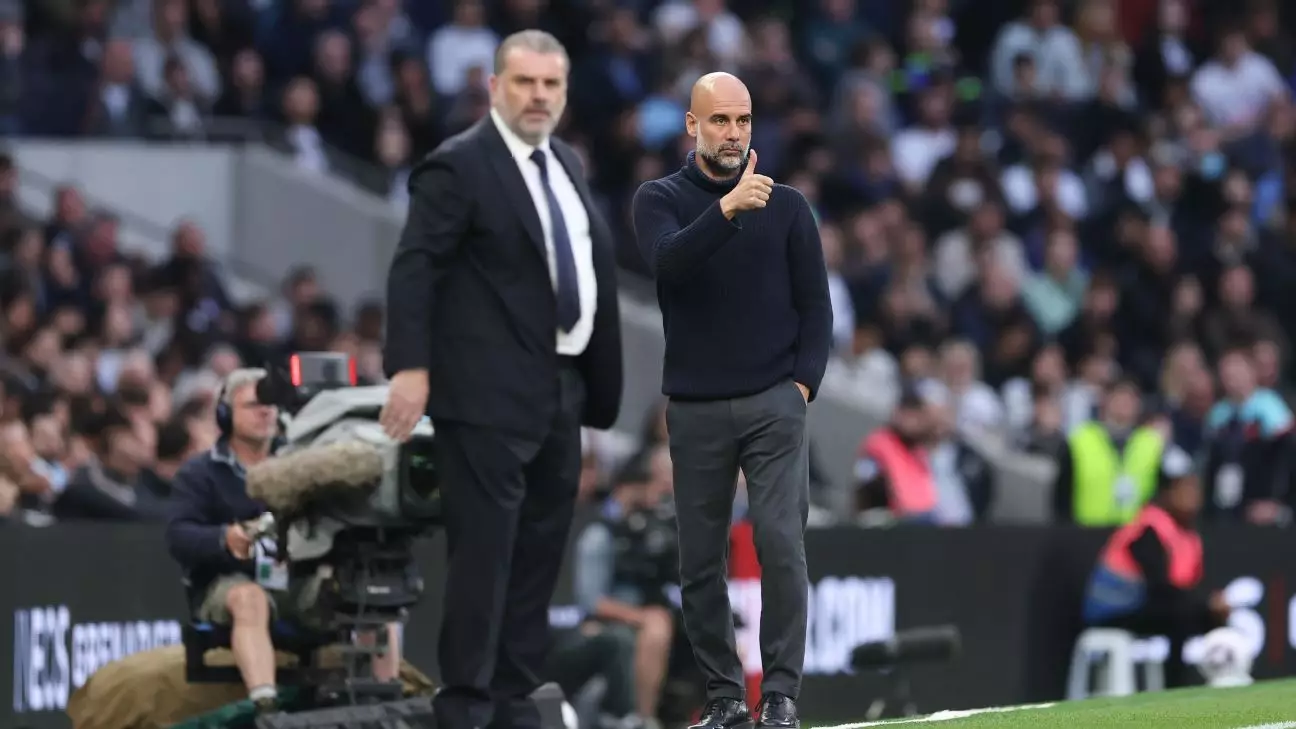Ange Postecoglou, the recently appointed head coach of Tottenham Hotspur, has sparked conversations not just regarding his tactical approach but also about his ambitions in a league dominated by formidable contenders such as Pep Guardiola’s Manchester City. Following Guardiola’s recent contract extension, which sees him committed to City until 2027, the Premier League landscape is set to remain intense. Postecoglou, however, expresses an intriguing mindset: rather than wishing for the departure of a rival coach who has defined success in modern football, he sees the opportunity for his side to challenge and potentially dethrone City’s supremacy.
Contrary to typical narratives where rival managers might hope for a rival’s exit to lessen competition, Postecoglou’s approach embodies the spirit of competition itself. It speaks volumes about his character and ambition; he doesn’t want to shrink from the challenge posed by a manager with Guardiola’s track record, but rather, he relishes the prospect of overcoming such a giant. Acknowledging the significant achievements associated with Manchester City, Postecoglou instead frames these challenges as essential benchmarks fuelled by his own desire to restore Tottenham to domestic glory.
In a world where mediocrity can loom large, the challenge Postecoglou faces is indicative of a larger ethos; one that embraces competition and encourages development against established greatness. He articulates a healthy perspective on excellence, suggesting that the presence of great teams elevates the standards across the league. Much like the myriad of situations in the sporting world where competitive desires can stimulate growth and performance, he feels that by aiming to surpass teams that are currently performing at a high level, he and his players can unlock their own potential.
This philosophy is not just a wish for competition but an actionable plan; Postecoglou’s insight into the nuances of Australian sports and their competitive nature teaches him that while any team may feel they can win, true excellence is often more elusive. He sees the rise of the bar as a necessity for innovation, calling upon his squad to aim for the extraordinary. By positioning themselves to challenge established norms, he invites both players and fans to share in the dream of success that has felt distant yet tantalizingly achievable.
The conversation took a serious turn, however, when the topic moved toward integrity in officiating — a crucial aspect of modern football. Postecoglou’s comments following the recent suspension of referee David Coote reveal a coach wary of undermining the officiating body but honest in recognizing the occasional failings of individuals. Postecoglou strikes a balance between allowing space for human error while still demanding a high standard from match officials as representatives of integrity in the league.
His refusal to let one individual’s mistakes tarnish the reputation of the entire officiating body showcases his understanding of the challenges that come with high-pressure jobs. Postecoglou recognizes that a narrative of disenchantment can breed dissatisfaction within clubs and their supporters, leading to a spiral of cynicism that could mar the essence of sport itself. He advocates for faith in the system, emphasizing that just like any line of work, errors are part of the human experience, and maintaining respect for officials is part of fostering the right environment for professional football.
Going forward, Postecoglou’s audacious ambition is clear: to re-establish Tottenham Hotspur as a club synonymous with success. He embodies a blend of respect for established powerhouses while simultaneously exhibiting a fierce determination to upset the status quo. His remarks not only reflect an ambitious outlook toward rival clubs but also an acute understanding of the dynamics of modern football, where every match can determine a club’s trajectory.
In an era of unparalleled competitiveness, where the margins for success are razor-thin, Postecoglou’s challenge rests not solely on tactics but on clever psychological crafting of his aspirations. It is an approach anchored in resilience and mastery, one that may inspire a generation of players, fans, and even fellow managers to embrace the exhilarating uncertainties of pinnacle competition. Ultimately, the narrative surrounding Ange Postecoglou is not merely validation of his coaching capabilities; it’s a powerful affirmation of resilience, ambition, and the unyielding spirit to reclaim glory.

